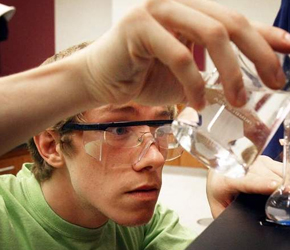Analytical Chemistry Degree
Analytical chemistry attempts to determine the properties of matter and how much of it exists in the universe. Analytical chemists work to obtain, process and communicate information that investigates the composition and structure of matter. Students who go to school to obtain an analytical chemistry degree will learn how to perform qualitative and quantitative analysis, validate and verify their finds using calibration and standardization, contextually interpret data, and perform separation using differential chemical properties.
Graduates with an analytical chemistry degree can find employment as chemists in fields that use computer models and statistics to collect data for government laboratories as well as in laboratories in the chemical, pharmaceutical, biotechnology, and food industries. Analytical chemists use this data to help assure food and water safety quality is being met, that corporations are in compliance with environmental regulations, to aid doctors in diagnosing disease, and that find other uses in a variety of fields environmental and health related fields.
Which Schools Offer the Best Analytical Chemistry Degree Programs?
U.S. News and World Report ranked these schools as having the top 10 analytical chemistry degree programs in the country as of 2010:
- University of North Carolina at Chapel Hill
- Purdue University at West Lafayette
- Indiana University at Bloomington
- University of Illinois at Urbana-Champaign
- University of Texas at Austin
- University of Arizona
- University of Michigan at Ann Arbor
- University of Florida
- University of Washington
- University of Wisconsin at Madison
What Kind of Course Curriculum Does an Analytical Chemistry Degree Require?
Analytical chemistry degree programs require students to take course in analysis and measurement that may not be apart of a general chemistry degree program. Students will take courses in quantitative analysis, chemical analysis, instrumental analysis, and several labs that teach the most common analytical methods. In addition to these courses, student will also take a standard course load required for all chemistry degrees that includes such class as:
- General Chemistry
- Organic Chemistry
- Physical Chemistry
- Analytical Chemistry
- Inorganic Chemistry
- Biochemistry
- Physics
- Calculus
- Technical Writing
Salary Expectations for Graduates with an Analytical Chemistry Degree
The median annual wage for chemists in 2008 was $66,230 a year according to the numbers compiled by the Untied States Bureau of Labor Statistics. The middle 50 percent received a yearly salary in the range of $48,000 and $89,000, while the top 10 percent received a yearly salary in excess of $113,000. The first year’s salaries for individuals with chemistry degrees averaged $37,000 a year in 2009, according to the National Association of Colleges and Employers. The highest salaries were in careers dealing with research and development. The bureau estimates an expected three percent employment growth for chemists in the job market between 2008 and 2018. Graduates who possess an advanced degree, especially those with PhDs, are expected to enjoy better job prospects working in research labs for larger pharmaceutical and biotechnology firms. Chemists held an estimated 84,000 jobs in the U.S. in 2008.

